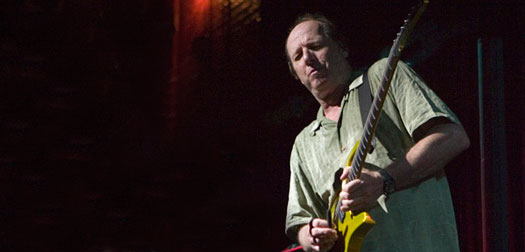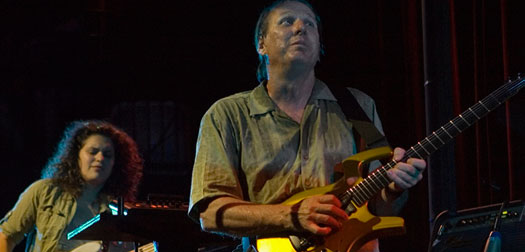Features
Adrian Belew
by Matthew Shapiro | photography by Michelle Arthur
November 1, 2008
Adrian Belew
by Matthew Shapiro | photography by Michelle Arthur
November 1, 2008
page 2 of 4
|
|
|
|
 |
||
|
|
|
Musically‚ I'm introducing a lot of the experimental‚ improvisational stuff that I do to this band. It's working so well with this band because they can go wherever I want to go. That's important to me because that's one of the reasons I wanted a power trio. When you have three people and they're really good‚ competent players‚ they have to fill in all the spaces and they have to do it right. And if that works‚ they can go anywhere and you can play anything and you can go all over the universe. So‚ it's not just having song forms‚ but having places in the arrangements where you can just space out and go out for a while. So we do things like that. "Beat Box Guitar" is a good example. They're designed for improvising‚ like a jazz composition where you have the head‚ you go out for a while and then you have something to come back to it.
There's not a lot of bands that can do that well. I mean‚ there are jam bands‚ but there's a difference between noodling and improvising. And group improvising where three minds are working together as one and going to same place -- that's very rare.
Well‚ in improvising‚ it must be fun to deconstruct some of your old songs and let them go free. Well‚ almost none of this material was originally done by a trio. You have the King Crimson material that was done by six people or four people. You have a lot of other pieces in there that I've done with a lot more instrumentation‚ or produced with a lot more stuff. I just tried to pick pieces that would suit this trio. And in doing so‚ there's a lot that can be done to speed it up or energize it and still bring it into now. The main thing for me with everything we do is to still be ahead of the curve now.
But with the trio‚ they take everything I give them. I don't have to give them much instruction‚ and I don't like to do that. Actually‚ I like it when they find their own way. I'll give some guidelines‚ but basically I'm looking for them to find their own voice.
How many songs have developed out of just being on the road with Eric and Julie? And when do you guys plan to get into the studio? None of it has developed from being on the road with Eric and Julie‚ but a lot of it has developed with the idea of Eric and Julie in mind. I want to write something that works for what we're doing. In terms of when we'll get around to recording‚ we've got a pretty heavy schedule this year‚ I'm really proud to say. Even though the economy is going down the chute‚ this is band is going up. [laughs] I would like to get in the studio before the end of the year. It just depends on when we can fit it in. I'd really like to have something out next year.

Well‚ there was already a version of "City of Tiny Lights‚" and I'm going say that it was sung by Ike Willis. Frank played it for me and I said‚ "I can sing it in that style if you want." I didn't do it in a different way; he basically wanted me to recreate it. And that worked out well. It became a really good staple of his. That record‚ Sheik Yerbouti‚ is the most popular Zappa record -- I can hardly believe it! [laughs]
Another one on that album that you added such a unique flavor too is "Flakes." How did that whole Dylan impersonation come about?
Yeah‚ there's an interesting story behind that one. Like I said‚ we rehearsed all week for three months‚ and on the weekends I would usually go home with Frank and he would show me what was coming up the next week. And that's how I could learn what he wrote. So‚ he was showing a new song he was writing‚ "Flakes‚" and a lot of people don't know this about Frank‚ but he couldn't really play and sing at the same time. If you ever watch him you'll notice that. So‚ I found out why with this song. He played it for me and he sounded like a bad folk singer. [laughter] I just started singing it like Bob Dylan‚ and he thought that was great and wanted to put that in the song. It really just came about because Frank sounded like a bad folk singer. [laughs]
That's interesting‚ because Frank always had incredible bands and I've read that he actually got many ideas from his players most of the time without crediting them. How much do you think you guys contributed to the songs? Do you think a lot of that went un-credited?
I think Frank always tailored his bands to the membership of the band. This particular lineup of younger guys -- Patrick O'Hearn‚ Terry Bozzio‚ Peter Wolf‚ Ed Mann‚ Tommy Mars -- I think he saw something more theatrical‚ more fun‚ back to more like the earlier days‚ like the Mothers days where they would wear costumes and do fun things. So‚ theater became a big part of it again. In terms of the music‚ I mean‚ those guys could play anything. They could play stuff that I couldn't play. I don't think it was a musical question; it was a personality thing. Here's a band that can do the fun stuff. That's just where Frank's head was at.
Watching the Baby Snakes movie‚ you can see how he fed off that.
Yeah‚ he really did like that. And we were young and happy to put on a dress [laughs]… if Frank asked.
Yeah‚ the sight of you in the dress singing "San Ber'dino" and ripping out that killer solo just popped into my mind. [laughs]
The whole year playing for me was such an amazing moment in my life‚ and I'm so fortunate that I had it. In my mind‚ I have this whole film that I can play‚ sitting like we're sitting‚ of talking with Frank over dinner‚ or on a plane or backstage or whatever. It's a rare commodity.That's interesting because I've read so much of how he seemed to keep musicians at arm's distance and kind of viewed them as "the help" or as some necessary evil‚ and how he would have done everything on a machine if he could. I read about how he used to stay at a different hotel than the rest of the band. But with you it seems like it was a lot different.
related articles
Shows: Zappa Plays Zappa
Blog: Mountain Oasis welcomes NIN‚ Bassnectar and Pretty Lights
Blog: Project/Object Show Canceled Due to Gail Zappa
Shows: Adrian Belew
Albums: Talking Heads - The Name of this Band is Talking Heads
More on: Adrian Belew, Frank Zappa, King Crimson, Robert Fripp, Talking Heads, David Bowie, Nine Inch Nails
Shows: Zappa Plays Zappa
Blog: Mountain Oasis welcomes NIN‚ Bassnectar and Pretty Lights
Blog: Project/Object Show Canceled Due to Gail Zappa
Shows: Adrian Belew
Albums: Talking Heads - The Name of this Band is Talking Heads
More on: Adrian Belew, Frank Zappa, King Crimson, Robert Fripp, Talking Heads, David Bowie, Nine Inch Nails
new to state of mind
Shows: moe.
Shows: Yonder Mountain String Band
Shows: Grand Point North 2014
Shows: Catskill Chill 2014
Shows: moe.down 15
Shows: Gov't Mule
Shows: Umphrey's McGee
Shows: Newport Folk Festival 2014
Shows: Widespread Panic
Albums: Phish - Fuego
Shows: moe.
Shows: Yonder Mountain String Band
Shows: Grand Point North 2014
Shows: Catskill Chill 2014
Shows: moe.down 15
Shows: Gov't Mule
Shows: Umphrey's McGee
Shows: Newport Folk Festival 2014
Shows: Widespread Panic
Albums: Phish - Fuego
random awesomeness
Blog: McCain Using Artists' Songs Without Their Permission; Foo Fighters Not Havin' It
Albums: American Babies - Flawed Logic
Shows: Umphrey's McGee
Shows: Lotus with Perpetual Groove
Blog: Listen: SCI's "Barstool" from Rhythm of the Road - Vol 1
Albums: Death - ...For the Whole World to See
Albums: The Decemberists - The King is Dead
Shows: The Meter Men with Page McConnell
Blog: Song of the Day: Kaki King - "Life Being What It Is"
Shows: Jackie Greene
Blog: McCain Using Artists' Songs Without Their Permission; Foo Fighters Not Havin' It
Albums: American Babies - Flawed Logic
Shows: Umphrey's McGee
Shows: Lotus with Perpetual Groove
Blog: Listen: SCI's "Barstool" from Rhythm of the Road - Vol 1
Albums: Death - ...For the Whole World to See
Albums: The Decemberists - The King is Dead
Shows: The Meter Men with Page McConnell
Blog: Song of the Day: Kaki King - "Life Being What It Is"
Shows: Jackie Greene
